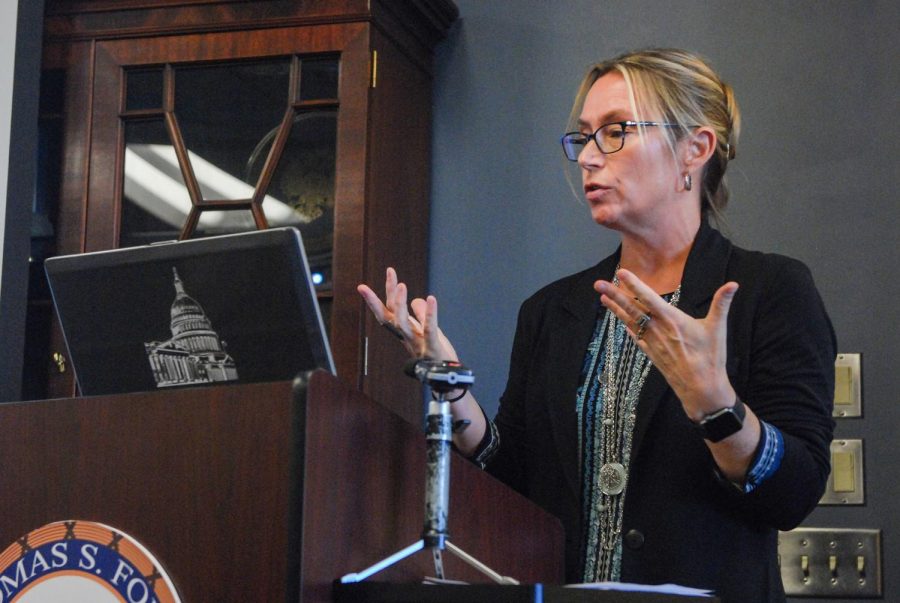Guest explains causes of political polarization
Critical theorist says right-wing paranoia stems from fears
Amy Allen, Pennsylvania State University philosophy department head, speaks about psychoanalysis and the politics of conspiracy theories on Wednesday afternoon, at the Foley Institute.
October 3, 2019
The Foley Institute hosted the head of the philosophy department of Pennsylvania State University, Amy Allen, to discuss how psychoanalysis theories apply to right-wing populism and political polarization in countries like the U.S.
Allen said psychoanalysis can offer critical theorists well-developed theories to understand political movements, such as the authoritarian populist rise occurring in many countries in Europe as well as America.
She said the danger with using psychoanalysis is that critical theorists tend to condescendingly characterize political ideologies they disagree with as abnormal. Allen said it can be problematic when critical theorists present themselves as more mature, autonomous and righteous than their political opponents.
She said the dismissive approach to explaining right-wing populism is wrong and counterproductive. She said populism is reacting to a real crisis.
“Right-wing populists do have genuine grievances which deserve to be validated,” she said.
Allen used psychoanalysis theories pioneered by psychologist Melanie Klein to help explain and understand right-wing populist perspectives.
Klein outlined two psychological positions that people tend to transition to and from throughout their lives. These two positions are heavily related to infant development but manifest themselves throughout peoples’ lives.
The first is the paranoid-schizoid position, characterized by high-persecutory or paranoid attitudes of distrust.
Allen said these paranoid attitudes are represented by right-wing populists in America because of fears of being left behind by globalization or fears of being disadvantaged by immigrants.
This position is not regressive, but rather a way of relating one’s self to others in periods of extreme stress and anxiety, she said.
Allen said this psychological position often leads to political polarization as people tend to demonize opponents and idealize power.
She said President Donald Trump is good at exploiting this persecutory anxiety and using it to fuel political polarization.
The other psychological position is the depressive position. Allen said this one accepts a more integrated experience of self and is more comfortable with ambivalence and uncertainty.
Allen said moving politics into a depressive mode requires a new understanding of democratic deliberation.
“Deliberation not to change people’s views but rather to change their views of others and others’ views,” Allen said. “This does not mean withholding judgments about racism and misogyny but trying to understand, not justify, why people hold such views.”
Allen said a mature political view is one that accepts loss and trade-offs.










Jeff • Oct 3, 2019 at 9:25 am
Well it is like the Foley Institute to provide only one side of any story and like the Evergreen to follow along. Professor Sheppard seems to only find issue with the right. Yes there is some crazy stuff going on on the right but as I sit in the middle I see no shortage of crazy on the left that remains unmentioned in this article. Now did Dr. Sheppard include this and the Evergreen left it out or is she another Left wing Professor indoctrinating America’s youth.
This polarization is a problem, I would argue our instant media is the majority of the problem. If it takes days for news to filter out there can be no tidal waves of emotion over any one news item. If the world knows things in just a few minutes there will be large parts of any population likely to have a serious reaction. This is exacerbated by a lack of honest news. Most networks today only attack Trump, the CIA has an analytical viewpoint that if news is skewed badly in any direction it is probably being manipulated. After all we live in a nation that elected Donald Trump meaning, at least half of the people voted for him. Yet 95% of major network news is negative.
One side is of course reinforced by this, the other feels under constant attack. Others of us are shaking our heads wondering what is wrong with you people. What did you expect when our two major parties gave the choice of Hillary Clinton and Donald Trump. Where none of you smart enough at that point to vote for someone else? No few were, and if you voted for Hillary Clinton I would argue that you are as responsible for the current state of our nation as anyone who voted for Donald Trump.
Lilian Martínez • Oct 3, 2019 at 5:09 am
Hola. Expresan mis pensamientos…sobre no menospreciar los movimientos de opinión no sobrevaluarlos y lo otro, explícitar los criterios sobre los comentarios no aceptados. Perfecto